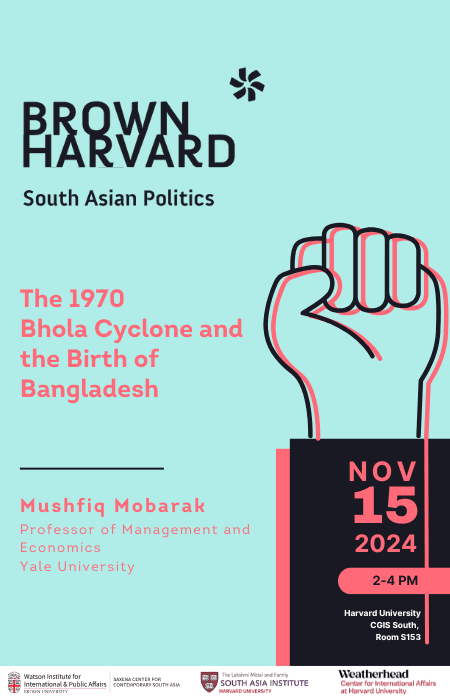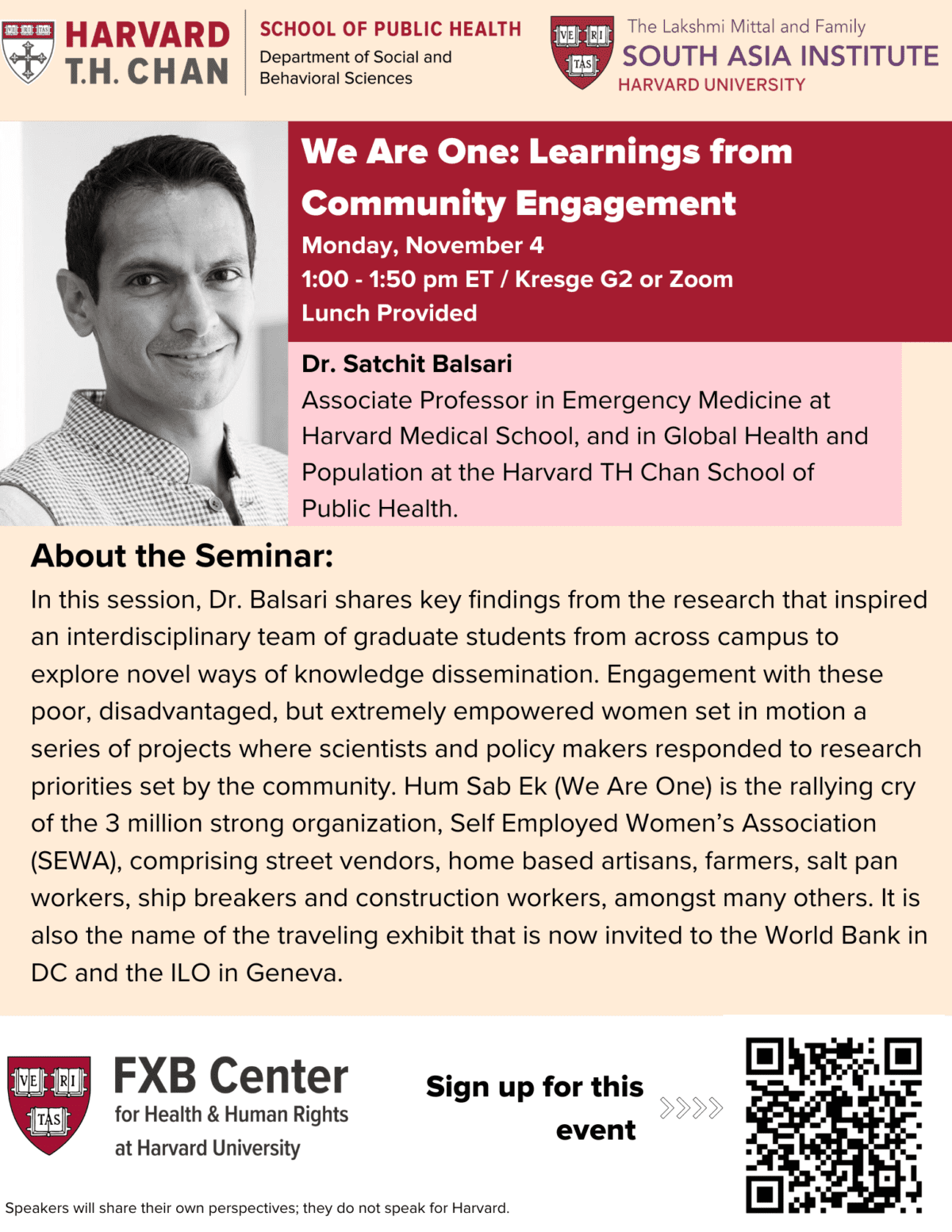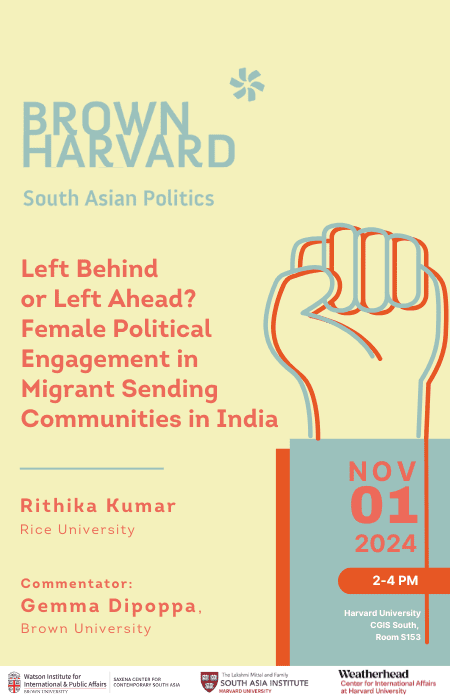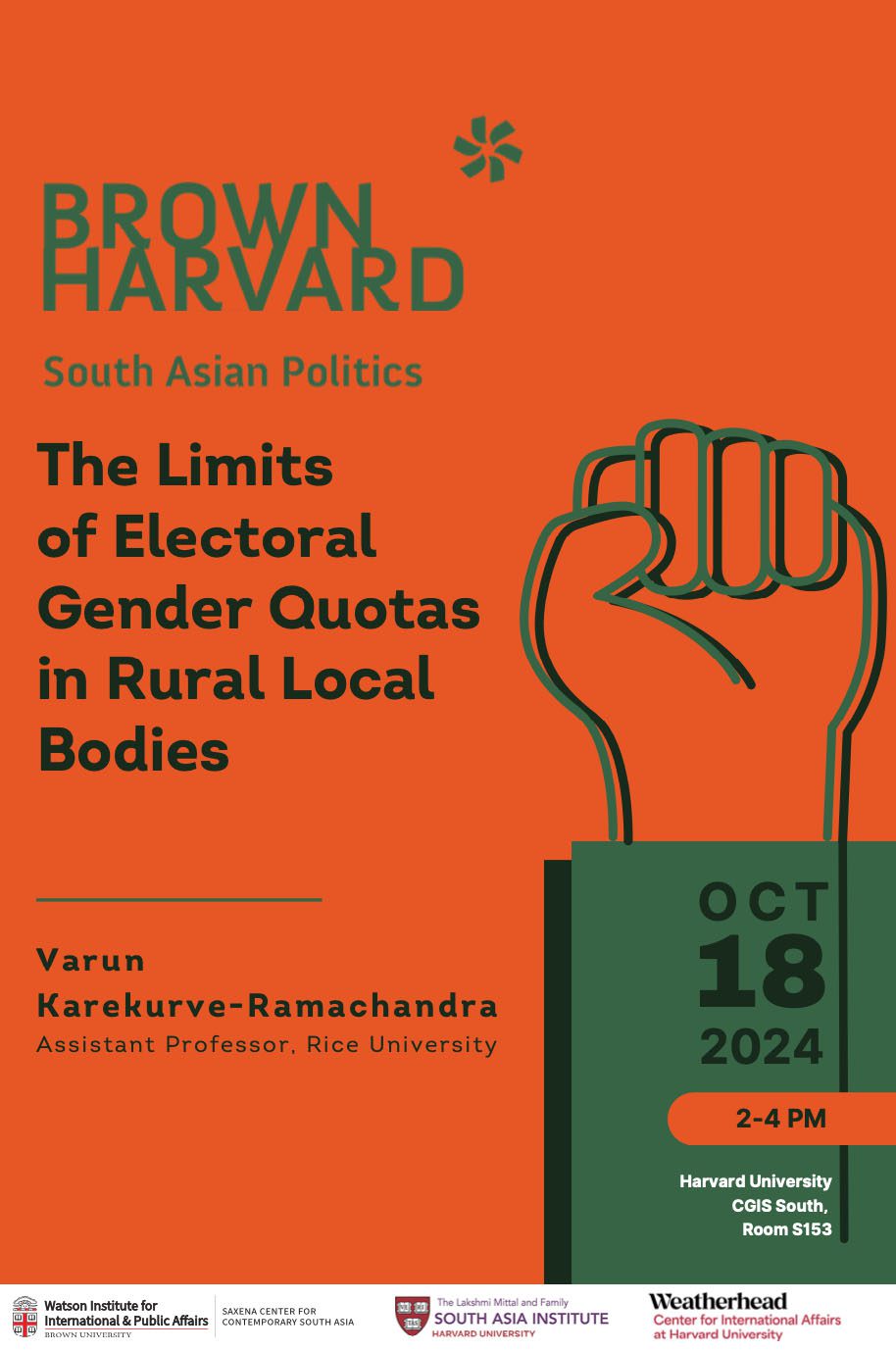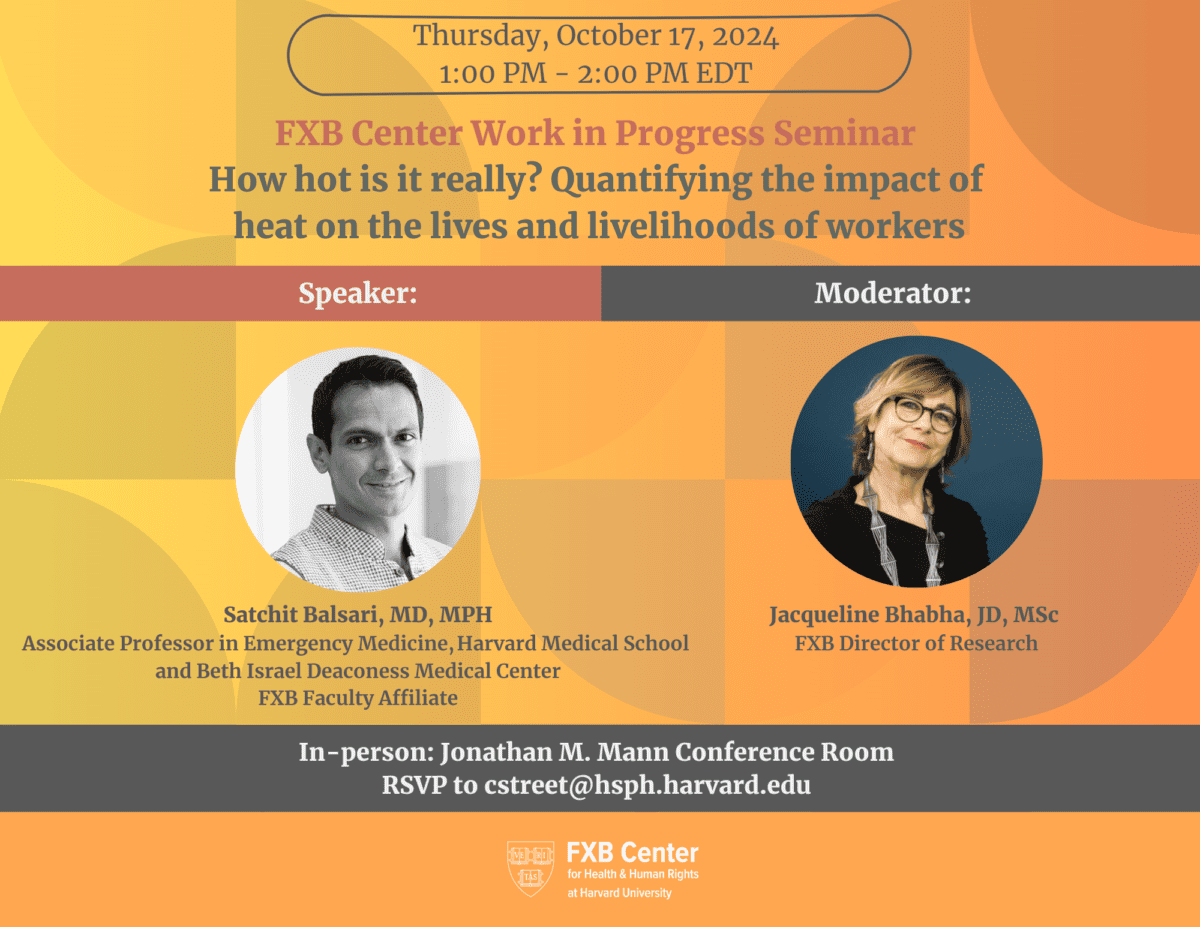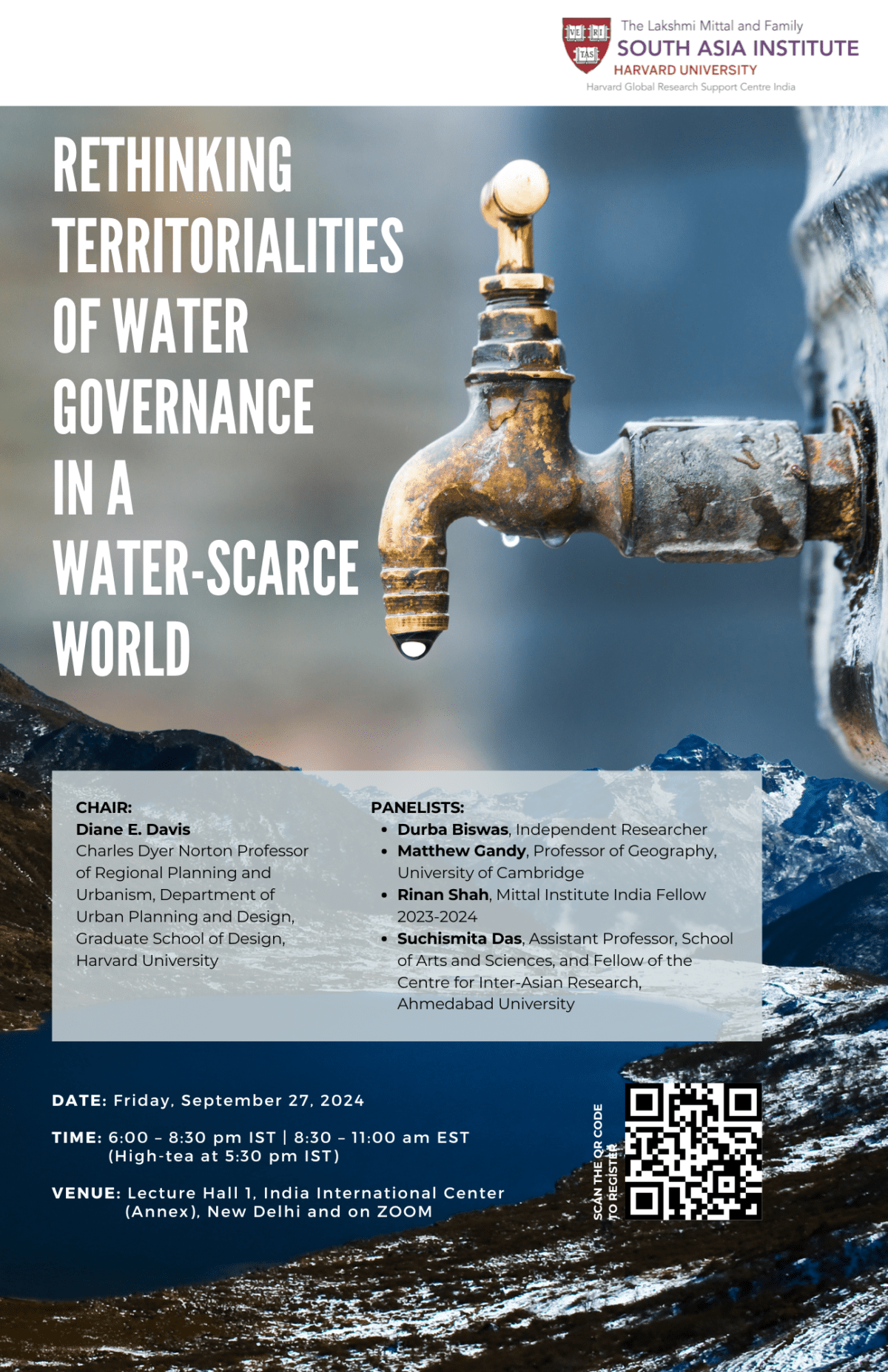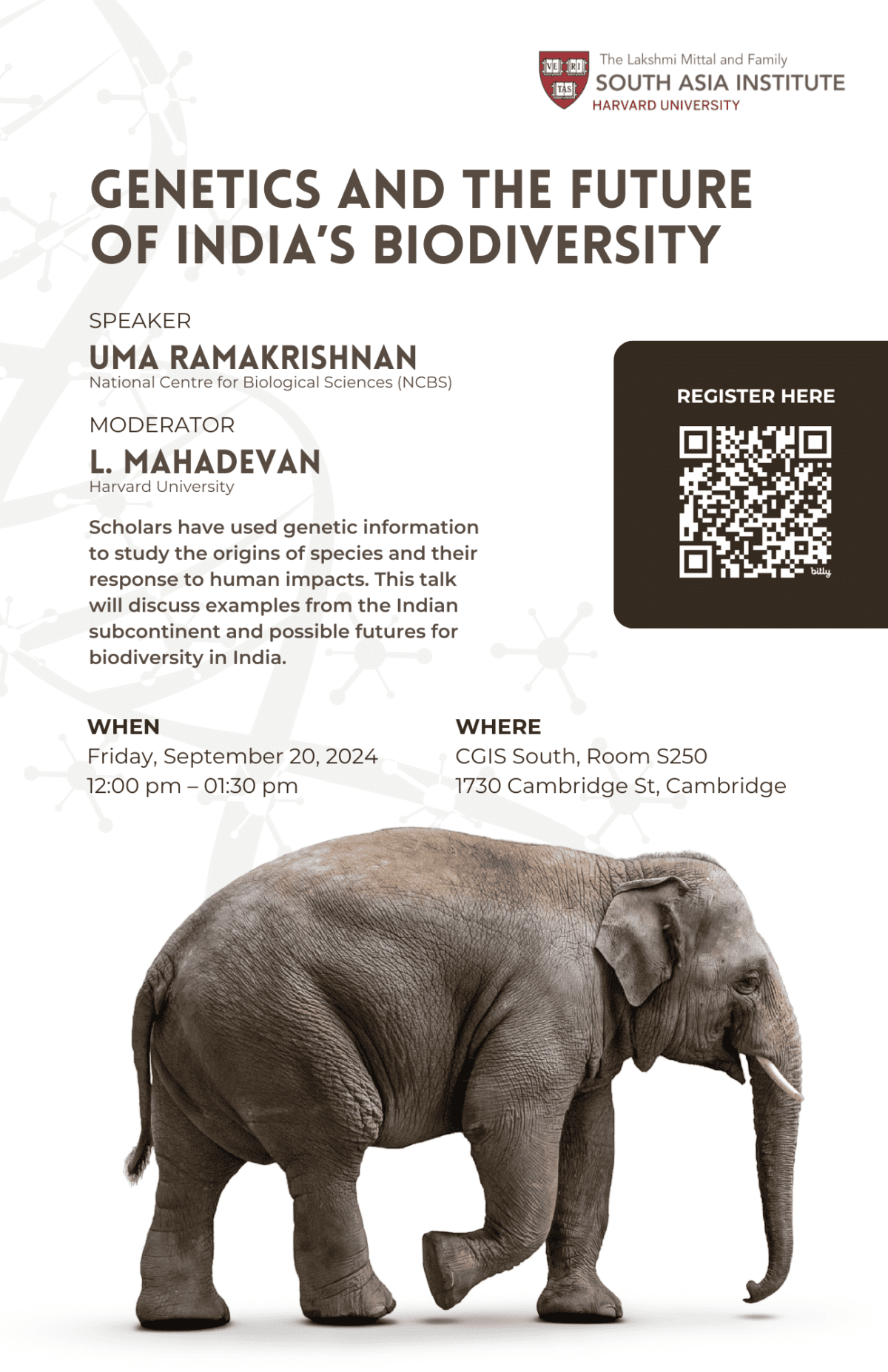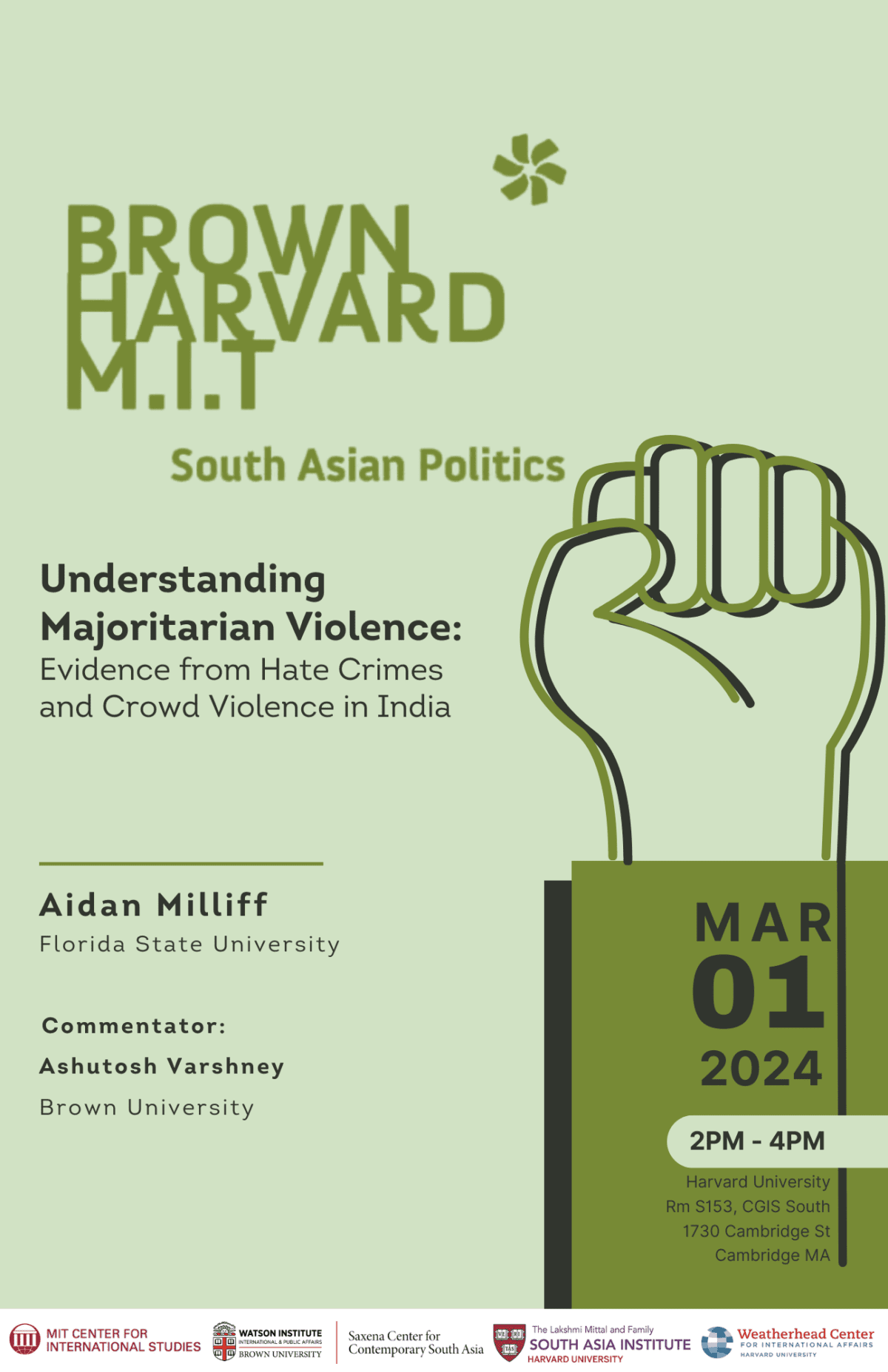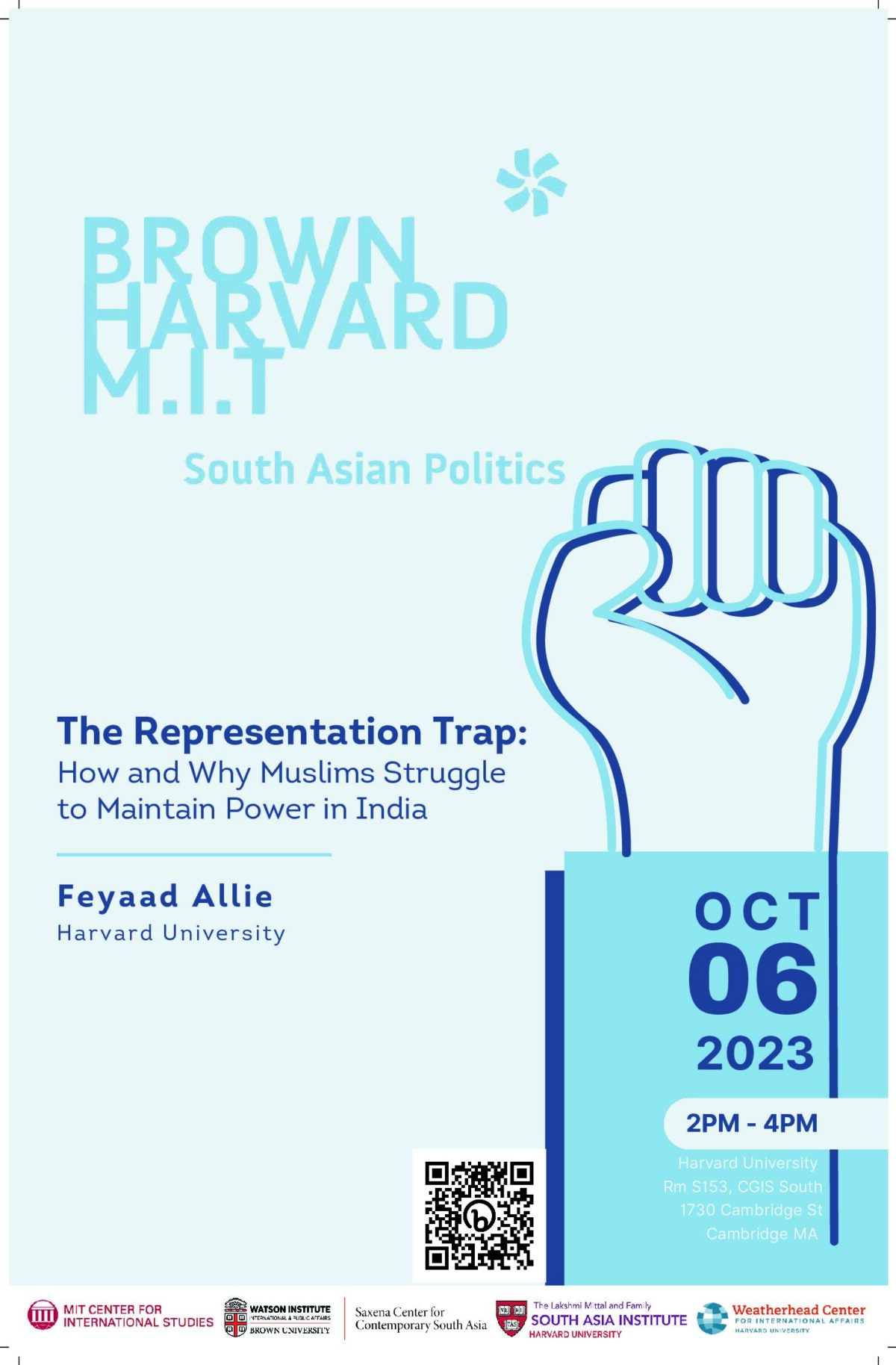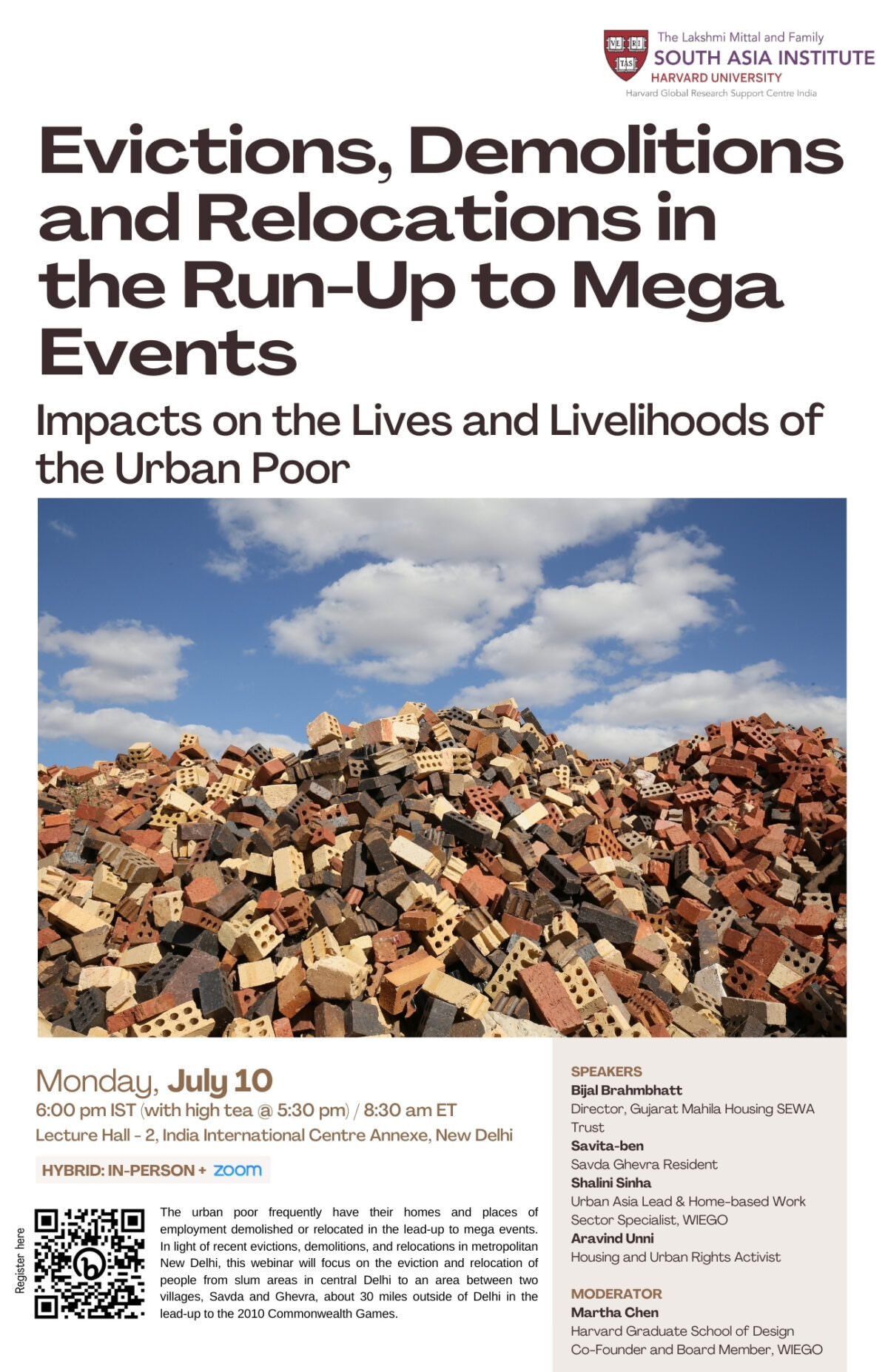WHEN
Fri, Nov 15, 2024 from 02:00pm — 04:00pm, ET
Join us for a Brown-Harvard Joint Seminar on South Asian Politics with Mushfiq Mobarak, Professor of Economics at Yale University.
More InfoWHEN
Fri, Nov 1, 2024 from 02:00pm — 04:00pm, ET
Join us for a Brown-Harvard Joint Seminar on South Asian Politics with Rithika Kumar, Assistant Professor of Political Science at Rice University.
More InfoWHEN
Fri, Oct 18, 2024 from 02:00pm — 04:00pm, ET
Join us for a Brown-Harvard Joint Seminar on South Asian Politics with Varun Karekurve-Ramachandra, Assistant Professor of Political Science and International Relations at the University of Southern California.
More InfoWHEN
Thu, Oct 17, 2024 from 01:00pm — 02:00pm, ET
VENUE
Boston – Jonathan M. Mann Conference Room, Harvard T.H. Chan School of Public Health, 651 Huntington Ave (Level 7)
In collaboration with hundreds of workers from the Self Employed Women’s Association, an interdisciplinary team at the Salata South Asia Climate Adaptation Cluster is following hundreds of workers across indoor and outdoor occupations using microsensors, biosensors, and biomarkers. The team is working on quantifying the impact of heat and humidity in the microenvironment that the poor work and live in on their health, well-being, and wages.
More InfoWHEN
Fri, Sep 27, 2024 from 06:00pm — 08:30pm, IST
Join us for the seminar, “Rethinking Territorialities of Water Governance in a Water-Scarce World” that speaks to claim-making for governance mechanism drawing from Right to the City in the face of climate extremes in the Global South.
More InfoWHEN
Fri, Sep 20, 2024 from 12:00pm — 01:30pm, ET
Please join us for a session on “Genetics and the Future of India’s Biodiversity” with Indian geneticist Uma Ramakrishnan and L. Mahadevan, Harvard Professor of Organismic and Evolutionary Biology.
More InfoWHEN
Fri, Mar 1, 2024 at 02:00pm, ET
VENUE
CGIS South, Room S153
Join us for a MIT-Brown-Harvard Joint Seminar on South Asian Politics with Aidan Milliff
More InfoWHEN
Wed, Feb 28, 2024 from 12:00pm — 01:00pm, ET
VENUE
Room 106/107 at 641 Huntington Avenue, Boston MA 02115 and online via Zoom
Join us to learn how a medical university in the most remote village of Nepal sets an example for the world and how resource-limited institutes like KAHS collaborate with Harvard Medical School for advancing evidence and innovation in Global Health.
More InfoWHEN
Fri, Oct 6, 2023 from 02:00pm — 04:00pm, ET
VENUE
Rm S153, CGIS South, 1730 Cambridge St
Feyaad Allie is a Post-Doctoral Fellow in the Department of Government at Harvard University. In July 2024, he will begin his appointment as an Assistant Professor of Government. Feyaad’s research broadly focuses on identity, democracy, and representation. His book project studies the causes and consequences of the political inclusion of marginalized groups with a focus on Muslims in India. In other work, Feyaad studies the intersection of technology and politics and the role of religion in intergroup relations. Across his research, he uses large-scale administrative data, original surveys, archival documents, and in-depth interviews during fieldwork.
More InfoWHEN
Fri, Aug 4, 2023 from 08:30am — 10:00am, ET
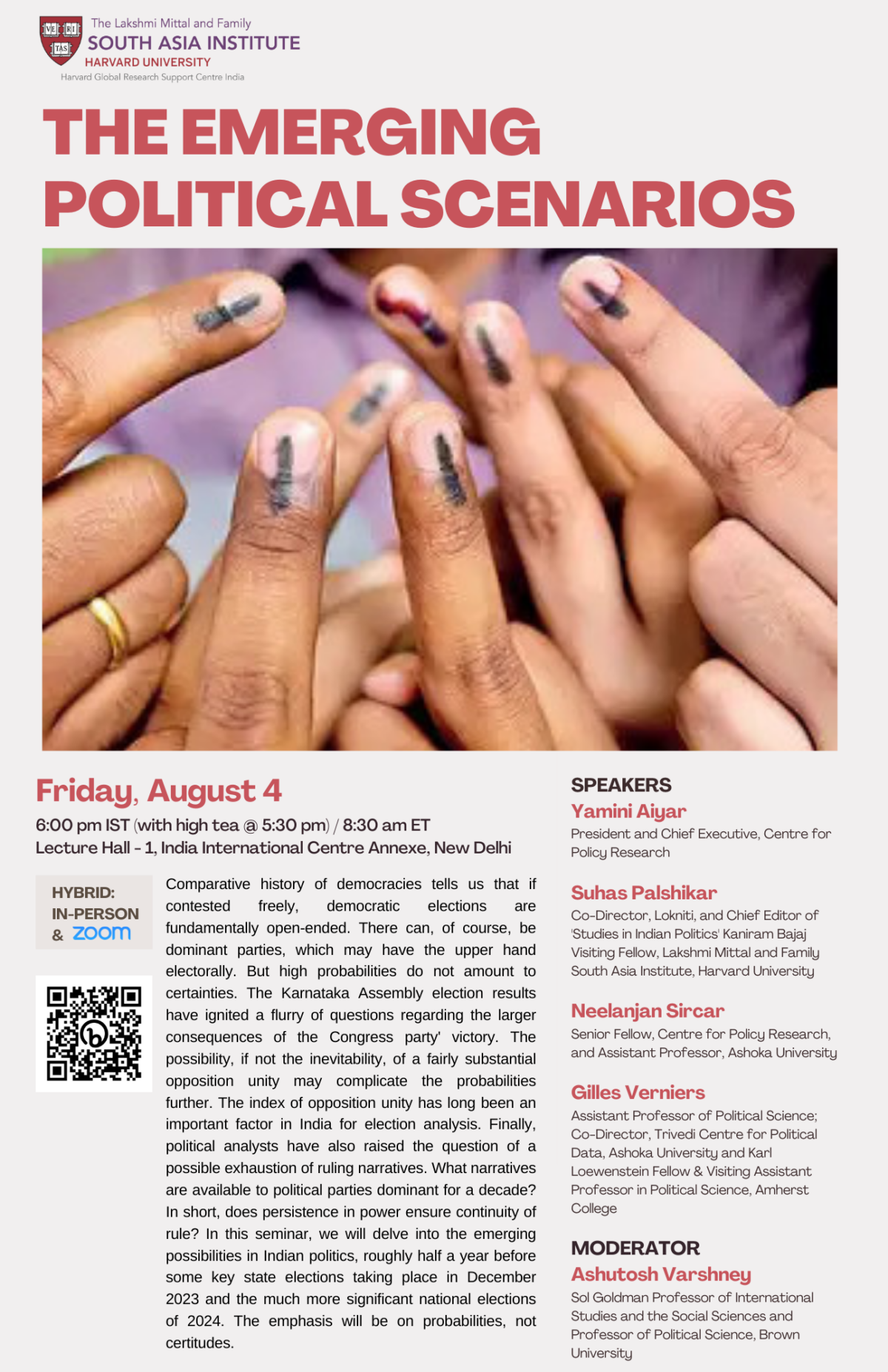
Comparative history of democracies tells us that if contested freely, democratic elections are fundamentally open-ended. There can, of course, be dominant parties, which may have the upper hand electorally. But high probabilities do not amount to certainties. The Karnataka Assembly election results have ignited a flurry of questions regarding the larger consequences of the Congress party’ victory. The possibility, if not the inevitability, of a fairly substantial opposition unity may complicate the probabilities further. The index of opposition unity has long been an important factor in India for election analysis. Finally, political analysts have also raised the question of a possible exhaustion of ruling narratives. What narratives are available to political parties dominant for a decade? In short, does persistence in power ensure continuity of rule? In this seminar, we will delve into the emerging possibilities in Indian politics, roughly half a year before some key state elections taking place in December 2023 and the much more significant national elections of 2024. The emphasis will be on probabilities, not certitudes.
More InfoWHEN
Mon, Jul 10, 2023 from 08:30am — 10:00am, ET
The urban poor frequently have their homes and places of employment demolished or relocated in the lead-up to mega events. In the light of recent evictions, demolitions, and relocations in metropolitan New Delhi, this webinar will focus on the eviction and relocation of people from slum areas in central Delhi to an area between two villages, Savda and Ghevra, about 30 miles outside of Delhi in the lead-up to the 2010 Commonwealth Games.
More Info